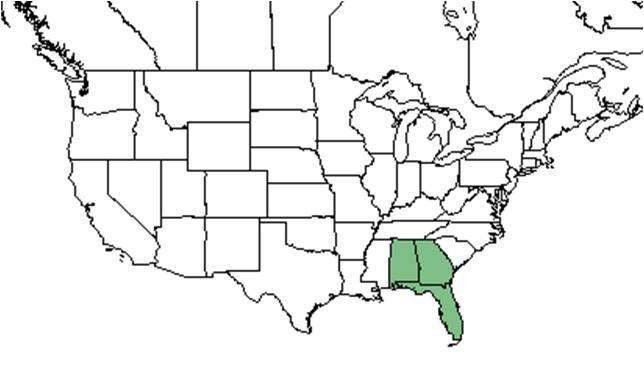Difference between revisions of "Eryngium aromaticum"
KatieMccoy (talk | contribs) (→Distribution) |
KatieMccoy (talk | contribs) |
||
| Line 29: | Line 29: | ||
==Ecology== | ==Ecology== | ||
===Habitat=== <!--Natural communities, human disturbed habitats, topography, hydrology, soils, light, fire regime requirements for removal of competition, etc.--> | ===Habitat=== <!--Natural communities, human disturbed habitats, topography, hydrology, soils, light, fire regime requirements for removal of competition, etc.--> | ||
| + | It can be found in well drained upland habitats<ref name="Native"/>. | ||
| + | |||
===Phenology=== <!--Timing off flowering, fruiting, seed dispersal, and environmental triggers. Cite PanFlora website if appropriate: http://www.gilnelson.com/PanFlora/ --> | ===Phenology=== <!--Timing off flowering, fruiting, seed dispersal, and environmental triggers. Cite PanFlora website if appropriate: http://www.gilnelson.com/PanFlora/ --> | ||
===Seed dispersal=== | ===Seed dispersal=== | ||
Revision as of 18:16, 11 December 2015
| Eryngium aromaticum | |
|---|---|

| |
| Scientific classification | |
| Kingdom: | Plantae |
| Division: | Magnoliophyta - Flowering plants |
| Class: | Magnoliopsida - Dicotyledons |
| Order: | Apiales |
| Family: | Apiaceae ⁄ Umbelliferae |
| Genus: | Eryngium |
| Species: | E. aromaticum |
| Binomial name | |
| Eryngium aromaticum Baldw. | |

| |
| Natural range of Eryngium aromaticum from USDA NRCS Plants Database. | |
Common name: oakleaf fleabane
Contents
Taxonomic notes
Description
E. aromaticum is a low growing, perennial herb that can be found as a basal rosette of slightly spiny, deeply dissected leaves through out most of the year. It has a carrot like taproot[1]. Leaves are simple and alternate[2].
Distribution
It is found throughout the peninsula and panhandle of Florida, along with parts of Georgia and Alabama[1].
Ecology
Habitat
It can be found in well drained upland habitats[1].
Phenology
Seed dispersal
Seed bank and germination
Fire ecology
Pollination
The following Hymenoptera families and species were observed visiting flowers of Eryngium aromaticum at Archbold Biological Station (Deyrup 2015):
Halictidae: Lasioglossum placidensis
Sphecidae: Tachysphex similis
Vespidae: Stenodynerus fundatiformis
Use by animals
Diseases and parasites
Conservation and Management
Cultivation and restoration
Photo Gallery
References and notes
Deyrup, M.A. and N.D. 2015. Database of observations of Hymenoptera visitations to flowers of plants on Archbold Biological Station, Florida, USA.
- ↑ 1.0 1.1 1.2 [Native Florida Wildflowers]Accessed: December 7, 2015
- ↑ [Hortipedia]Accessed: December 7, 2015